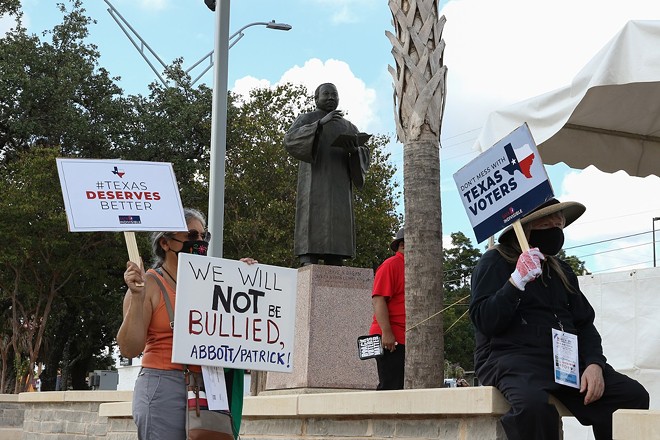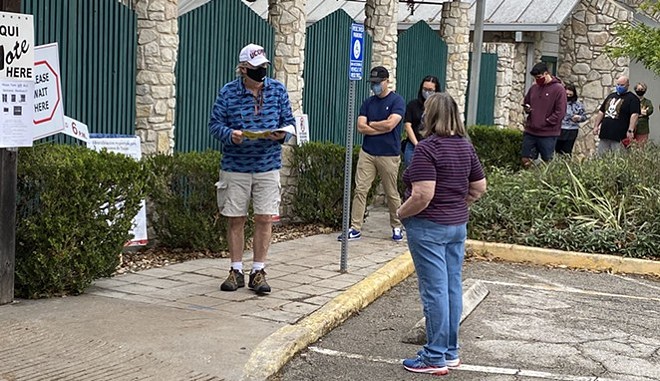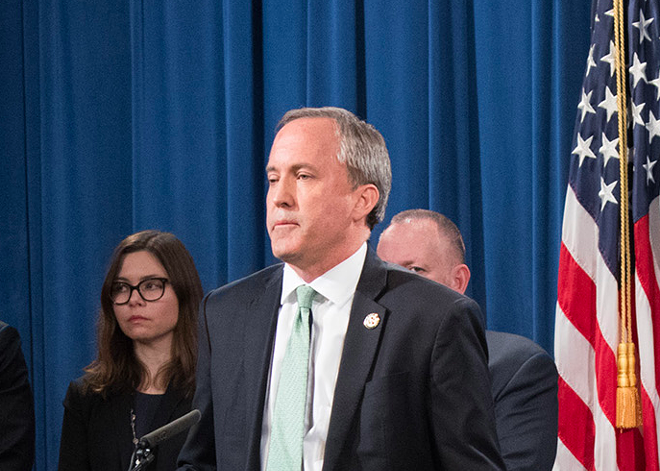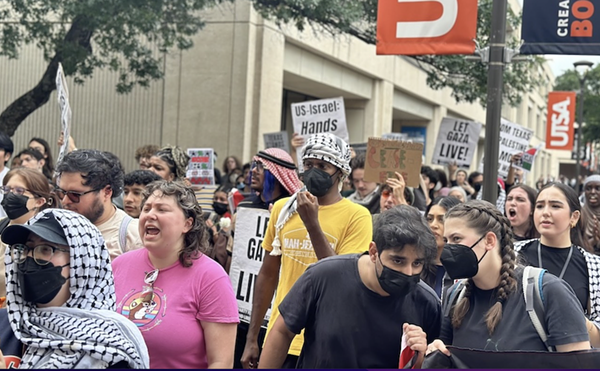
Last session of the Texas Legislature, Republican lawmakers passed a sweeping bill that gave more protections to partisan poll watchers, made it harder to vote by mail and prevented local authorities from making it easier for Texans to cast ballots.
Voting-rights advocates blasted the proposal as an effort to suppress the votes of people of color and other Democrat-leaning voters. Meanwhile, Democrats in the Lege fled to Washington, D.C., in a bid to run down the clock before the measure could pass.
In the end, Republican Gov. Greg Abbott extended the session, and the GOP-controlled legislature passed the bill anyway.
Now, even after that decisive victory, the state's Republican lawmakers are once again trying to make it harder for Texans to vote.
With a new session underway, Texas state lawmakers had filed 128 voting-related bills as of press time, according to a tally by the Voting Rights Lab, a nonpartisan organization that pushes for fair and free elections.
The majority filed by Democrats seek to expand voting rights by adopting practices such as online voter registration, something already available in the majority of other U.S. states.
However, most of the Republican-authored measures reviewed by the Current seek to further limit poll access, impose harsher penalties for illegal voting or give more authority to the state to pursue voting-related criminal charges.
As with 2021, GOP lawmakers are couching their bills as efforts to boost election security even though Texas has some of the most restrictive voting rules of any state.
The new proposals also come as Republican lawmakers across the country continue to double down on former President Donald Trump's repeated lies that the 2020 election was riddled with fraud.
Such claims have been repeatedly debunked and rejected by courts. What's more, a raft of insider communications from media outlet Fox News made public last week in a court filing showed that the network's stars and executives privately ridiculed Trump's election fraud lies while promoting them on-air.
"I don't think anyone who's been following the facts, even the authors of these [Texas] bills, believes there's rampant voter fraud," said Anthony Gutierrez, executive director of Common Cause Texas, a nonpartisan group that advocates for making voting more accessible. "It's clear to me that the intent here is to suppress the votes of Black and Brown people and to make it harder to vote, especially in areas of the state that are more progressive-leaning."
At least two of the new Republican-authored bills would change the penalty for illegal voting in Texas from a misdemeanor to a felony — a charge that was actually downgraded in the 2021 elections bill.
Another would give the officer of Republican Attorney General Ken Paxton — a die-hard Trump loyalist — more authority to prosecute election crimes, while a third would enable the Texas Secretary of State to appoint a special unit of election marshals to pursue election-related criminal charges.
Additional GOP-penned "election security" proposals introduced this session would ban polling places on college campuses and require the state to collect the thumbprints of people who use mail-in ballots.

Voter intimidation
Voting-rights advocates say they're most troubled by the bills that would set up a police unit to pursue election-related charges. Instead of curbing illegal voting, which the state already is able to pursue through existing statutes, such proposals are designed to intimidate voters on the margins.
Florida and Georgia both adopted similar elections crimes units in the wake of Trump's 2020 defeat. Advocates point to warning signs in both of those states.
Last summer, Florida Gov. Ron DeSantis announced that his state's newly minted voting crimes task force had arrested 19 people, all people with prior criminal convictions that should have prevented them from casting ballots.
But media probes revealed that many caught up in the sweep had been told by government officials that they were authorized to vote. Indeed, some received voter registration cards in the mail, which they read as a signal that they had been legally approved to cast a ballot, according to an analysis by the UK publication the Guardian.
While the launch of Georgia's new election crimes unit wasn't accompanied by a similarly high-profile dragnet, voting-rights groups say data from the 2022 primaries suggest that the law-enforcement unit is having its intended result: scaring Black voters away from the polls.
Georgia tallied similar turnout numbers in the 2022 midterms to those it recorded in 2018. However, an analysis by nonprofit law and public policy institute the Brennan Center for Justice showed that the turnout gap between white and Black voters in the most recent election hit its highest number since at least 2014.
White turnout was 8.6% higher than nonwhite turnout in November, according to the center's number crunching. That's higher than any general election of the past decade, and around 50% percent higher than in the prior two midterms. 17
15 "It's important to look behind the top-line number when trying to see how these bills will effect particular groups of voters," said Eliza Sweren-Becker, counsel in the Voting Rights & Elections Program at the Brennan Center for Justice. "What these offices are really designed to do is scare vulnerable people away from casting ballots."
State Sen. Paul Bettencourt, R-Houston, who filed the Texas bill proposing the creation of the election crimes unit didn't respond to the Current's request for an interview.
Bettencourt filed a similar election police proposal during 2021, although that one died in the House. That session, he also authored a failed bill that would have created a civil process that would have allowed candidates and political parties' county chairs to demand audits of election outcomes they didn't like — a process opponents said would allow virtually any contest to devolve into a litany of frivolous complaints.

'Developing country'
Beyond the intimidation factor, voting-rights proponents said the Texas bills targeting election crimes and stiffening illegal voting penalties will have real consequences for anyone swept up in a partisan dragnet like the one DeSantis engineered.
Even in cases where the charges are eventually overturned, they're most likely to be brought against people on the margins, advocates argue. A lengthy court battle to avoid jail time for an honest mistake can yield insurmountable hardship.
Texas already faces a firestorm of controversy over its conviction of Fort Worth resident Crystal Mason on illegal voting charges. Mason received a five-year sentence after authorities accused her of turning in a provisional ballot during the 2016 election while on supervised release for a federal offense.
The case has drawn national attention because Mason, who said she didn't know she was disqualified from voting, filled out the provisional ballot at the advice of a poll worker. The Texas Court of Criminal Appeals has since ruled that a lower court must look at the case again and consider evidence of her intent when filling out the ballot.
Indeed, voting-rights proponents argue that the creation of specialized voting police is antithetical to a functioning democracy.
"It's the sort of thing you'd see in a developing country, not in a country that's had peaceful transfers of power for 200 years," Daniel Griffith, senior director of policy for Secure Democracy USA, a nonpartisan organization based in Washington, D.C., that seeks to improve voter access.
Legislative priorities
During last week's State of the State Address, Gov. Greg Abbott didn't include tightening election laws as one of his priorities for the Texas Legislature to tackle this session.
However, Republican Lt. Gov. Dan Patrick, who presides over the Texas Senate, did list election security among his 21 priorities for the session. In particular, Patrick said he wanted to see illegal voting returned to a felony-status crime. 19 17 So far, at least two Republican-filed bills would reimpose that penalty.
State Sen. Bryan Hughes, R-Mineola, didn't respond to the Current's request for comment on his proposal. However, Rep. David Spiller, R-Jacksboro, author of the House bill making election fraud a felony said the stiff penalties are needed to ensure safe and secure elections.
"People need to be able to rely on the results of our elections," he said. "When people tell me there's no election fraud and things like that, that's just not true."
The state pursued 534 illegal voting cases between 2005 and June 2021, according to Spiller.
But that number is misleading, voting-rights advocates maintain.
Just because the Texas Attorney General brought a case doesn't mean it ended in a conviction. A ProPublica investigation from November found that of the 390 election-related investigations Paxton's office opened between January 2020 and September 2022, the AG only secured five convictions.
It starts at the top
Despite the low number of prosecutions coming from Paxton's office, advocates for free and fair elections said state Republicans' overheated rhetoric around voter fraud is already damaging democracy by reinforcing debunked conspiracy theories and driving voters away from public participation.
"Our democracy works best when all voters participate," said the Brennan Center's Sweren-Becker. "Undermining trust in elections and excluding groups of people from the electorate undermines the democratic process."
That lack of trust is already apparent in Texas, critics of new election security measures charge.
The legislature's new spate of proposed poll restrictions comes as local elections officials face unprecedented harassment and physical threats. Over the past two years, approximately one-third of the state's election administrators have tendered their resignations, the Texas Tribune has reported, citing data from the Texas Secretary of State's office.
Despite the massive changes to Texas' voting laws since 2021 and the Attorney General's increasingly aggressive efforts to prosecute illegal voting, the state only spends roughly $4 million annually on voter education, Common Cause's Gutierrez points out.
That disconnect is intentional, he said. And it starts at the top. Even if Abbott hasn't prioritized election security bills in this session, he's likely to sign them, and he's been one of the state's loudest voices when it comes to unsupported claims of voter fraud, according to advocates.
"It's very clear to me that Greg Abbott has been the architect of the repeated attempt to claim there's widespread voter fraud in Texas," Gutierrez said. "He's been on this crusade since 2006, when he was still the attorney general."
Follow us: Google News | NewsBreak | Instagram | Facebook | Twitter

















